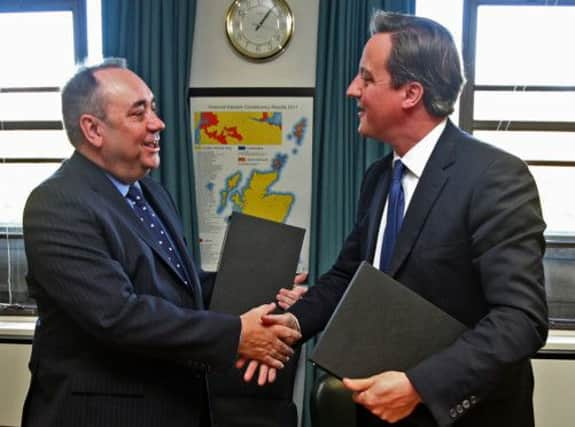Willie Rennie: The fear in a continental drift


The atrium at Kirkcaldy’s Adam Smith College last Friday evening echoed to the strident heckles of Nationalists and socialists as Labour MSP Claire Baker, the Tories’ Murdo Fraser and I sought to persuade hardened political activists about the merits of the United Kingdom.
When the topic turned to the European Union, their heckles turned to guffaws. There was delight amongst our opponents, as they see the rise of Nigel Farage and Ukip as a gift to the independence cause.
Advertisement
Hide AdAdvertisement
Hide AdAnd they were trotting out the lines from their leader, First Minister Alex Salmond, who seems to believe the threat that the UK could leave the EU is a coup for their independence cause.
What is the context for this? When Humza Yousaf, the Scottish Government minister for external affairs and international development, misrepresented the UK government position on membership of the EU to an international conference in Doha recently, he caused confusion in the audience and bemusement to UK diplomats.
With barely disguised glee, Mr Yousaf went on to tell the audience that the UK government wanted to leave the EU. For a minister this was sloppy, but, revealed an unthinking and misguided enthusiasm for his position.
Mr Salmond has been keen to tell us that independence is only a little step. Not radical, no threat, perfectly normal and reasonable. The currency, common travel, good regulation and much more that’s British would stay. It’s his gradualist approach to independence.
We seem to have long forgotten the divide between those in the SNP who believe that independence can be secured by Holyrood gradually accumulating more power over a protracted period, and others who support the route-one method.
The gradualist supports a steady, stealthy, approach. It is for that very reason that there is puzzlement at the Nationalists’ joy at the prospect of Britain leaving the EU. Britain leaving would be bad for every country in Europe, including Scotland, independent or not. Wrenching Britain out would not be steady or stealthy and it is certainly not gradualist.
Much of the SNP strategy for winning the referendum is based on the misconception that the UK government will be obliged to agree to every demand, no matter how unreasonable, from an independent Scottish Government.
Yet without direct representation and, therefore, no direct influence in the House of Commons there is absolutely no guarantee that the rest of the UK (rUK) will do so.
Advertisement
Hide AdAdvertisement
Hide AdThey tell us an independent Scotland will demand a shared currency, the Bank of England as the lender of last resort, a common travel area, shared borders, a common set of regulations and much more.
I need you to now use your imagination. Just go with me. Scotland votes to separate from the UK – I’ve clearly not been reading the polls. Next, imagine the rUK puts its reasonable self-interest to one side and is willing to concede that every single one of Scotland’s demands should be met – so, for a moment, put to one side that the rUK may not play ball. Britain exits the EU – no matter how unlikely. Then imagine that an independent Scotland agrees terms of membership of the EU without a hitch – yes, you need a colourful imagination.
So Scotland is independent and a full member of the EU and the remainder of the UK is outside the EU. Even if all those high hurdles were to be overcome, the practical challenges would still be considerable.
An independent Scotland could be subject to EU laws on the financial sector that the rUK would not. How would the financial sector that straddles the Border cope?
An independent Scotland may be subject to new immigration rules through the Schengen agreement that the non-EU rUK would not. What would that mean for travel across the British Isles?
The central bank for the British currency union would not only be run by a foreign government but by a foreign government outside of the EU. How would the markets react?
Scotland’s trading relationship with other parts of the UK is essential. With one in and one out of the EU trading block, what kind of impact would that have on Scottish businesses?
Persuading a foreign UK government to form partnerships in all these areas, even if they are against the rUK interest, may be the easy part. Forming all these partnerships with one partner out of the European Union may pose insurmountable obstacles.
Advertisement
Hide AdAdvertisement
Hide AdI believe that Scotland’s best interests are served remaining part of the UK and the UK remaining a member of the EU. On Friday evening I told Mr Fraser that the Tories had taken leave of their senses in pandering to the Ukip tendency in their party. I believe the Tories are as right about the Scottish independence referendum as they are wrong about their proposals for an EU referendum, Yet, I too believe we can defeat both separatist movements.
Despite what the Nationalists may wish, the UK government’s position is to remain in the EU. It is the position of all three UK leaders including David Cameron and is the position of the vast majority of MPs.
All of this speaks to the desperation in Nationalist ranks as they fail to make progress towards winning the referendum. Mr Salmond, ever the tactician, has misjudged what developments on the European Union mean for his plans. He was already in a precarious position; he may have just made it worse.
• Willie Rennie is an MSP for Mid Scotland and Fife and leader of the Scottish Liberal Democrats